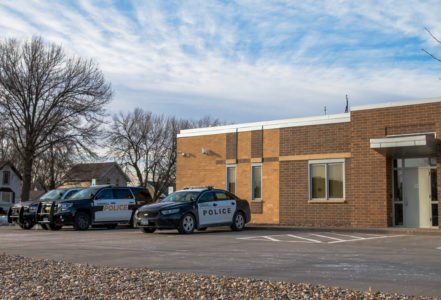
The Grinnell Police Department (GPD) recently released its 2017 annual report, which contains crime statistics for the year as well as details of police operations. The report showed that crime in 2017 stayed relatively close to the 2016 numbers, though with notable increases in narcotics and sexual abuse cases and decreases in burglary, theft and overall arrests. Grinnell experienced no murders in 2017.
In an email to The S&B, Police Chief Dennis Reilly noted that better recordkeeping, rather than actual changes in crime frequency, may explain the increase in the number of calls for service. Continued implementation of new records management software at the department might be behind the increase in the overall number of calls for service, since it includes topics from reports of criminal activity to traffic enforcement and medical and fire emergencies. Explaining why the number of calls for service increased while arrests decreased, Reilly said that increases in calls for service do not always generate proportional increases in arrests and said that much of the increase came from large increases in minor categories such as nuisance property complaints or fireworks complaints.
“The reduction in arrests equates to just over one less per week. I will say that I have noted, and this is more of a personal observation in reviewing reports and working night shifts periodically, that our public intoxication arrests appear to be less. We have also seen a decrease in OWI arrests over the last couple of years,” Reilly wrote.
In 2017, there were 100 narcotics related investigations, a 30 percent increase from 2016. Reilly wrote that this increase could be the result of increased reporting because of better community-police relations and the work of GPD’s narcotics investigator. GPD lost grant funding in 2012 for the officer’s salary because of federal budget cuts, but was able to reallocate resources and rehire a dedicated narcotics officer in 2016. In terms of types of narcotics, Reilly stated that drug crime in Grinnell is concentrated mostly in methamphetamines and marijuana, and that, thankfully, problems with opioids have been minimal.
Grinnell also saw a 31 percent increase in sexual assault over 2016, and Reilly thinks it is difficult to pinpoint the factors behind this issue. He wrote that continued cooperation between GPD, the community and the College is paramount, and urged students and community members to be vigilant, especially at parties and in situations involving alcohol and other substances.
“GPD works closely with our local sexual assault advocates, whether they are based out of Grinnell College or Crisis Intervention Services. Not being a sexual assault prevention expert, we rely on these advocates to be the experts in not only addressing the needs of sexual assault victims but also in awareness and prevention components,” Reilley wrote. “Often times, these acts take place when the victim is under the influence of alcohol or some other substance. We need to make sure that party hosts and attendees are aware of this, seeking to identify those who may have had to [sic] much to drink and ensuring their safe return home.”
Additionally, Reilly looks forward to GPD collaboration with advocates for Sexual Assault Awareness Month and says that GPD is committed to respecting the wishes of survivors of sexual assault.
“Sexual Assault Awareness Month is April, where our advocates will campaign to raise public awareness about sexual assault while educating individuals on how to prevent this violence. It is my hope that our advocates will include law enforcement in these awareness and prevention presentations since it is important for individuals to be acutely aware of law enforcement’s approach to sexual assault investigations,” Reilley wrote. “[GPD seeks] to respect the wishes of our victims as it relates to sexual assault investigations while seeking to collect evidence and obtain statements while memories are fresh. Unless there is an identified risk to public safety, GPD will not proceed with criminal prosecution until the victim is ready.”
Finally, Reilly stated that GPD seeks to maintain a strong relationship with the College and student body and enumerated some of the ways in which GPD works to build that relationship.
“GPD is continuously working to strengthen and build relationships,” Reilley wrote. “We are always looking for opportunities to broaden our engagement activities on campus, and I would be hard pressed to recall an invitation that we turned down.”
Thus, with cooperation key to preventing or reducing crime, the GPD is looking forward to a new year with a safer community.























































